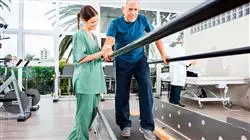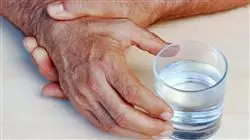University certificate
The world's largest faculty of physiotherapy”
Introduction to the Program
Neurodegenerative diseases require specific treatments in the field of physiotherapy that allow patients to regain mobility"

The wide variety of neurodegenerative diseases, complex diagnoses, different rates of progression and different prognoses, their multiple clinical manifestations, and rapid scientific and technical progress are all factors that necessitate specialized professionals in neurorehabilitation in order to ensure coordinated intervention in patients. Physiotherapists are a fundamental component in any multidisciplinary team, because these diseases cause alterations in various body activities, such as movement, balance, breathing, speech or heart functions.
That is why it is essential for physiotherapists to specialize in the treatment of these diseases in order to help those affected to improve symptoms, relieve pain, improve functional capacity, slow down the disabling process of the disease and stimulate independence and physical functions, since physiotherapy has proven to be effective in alleviating the consequences of neurodegenerative diseases.
To achieve this objective of providing these professionals with up-to-date education, TECH has designed this comprehensive Masters Degree, which has a teaching staff composed of specialists in the areas of intervention of each pathology, from health centers and prestigious universities, sensitized to quality continuing education based on scientific evidence to provide a holistic approach to the patient with neurodegenerative disease, and committed to quality teaching through new educational technologies.
In short, Masters Degree has set out to create contents of the highest teaching and educational quality that will turn students into successful professionals, following the highest quality standards in teaching at an international level. For this reason, TECH presents this program with a rich content that will help you reach the elite of neurological physiotherapy.
Immerse yourself in this high-level Masters Degree and improve your skills in therapies for people with degenerative diseases"
This Masters Degree in Neurological Physiotherapy in Degenerative Diseases contains the most complete and up-to-date scientific program on the market. The most important features include:
- The development of numerous practical case studies presented by specialists in Neurological Physiotherapy
- The graphic, schematic and practical contents of the course are designed to provide all the essential information required for professional practice
- Exercises where the self-assessment process can be carried out to improve learning
- Algorithm-based interactive learning system for decision-making
- Special emphasis on innovative methodologies in Neurological Physiotherapy
- Theoretical lessons, questions to the expert, debate forums on controversial topics, and individual reflection assignments
- Content that is accessible from any fixed or portable device with an Internet connection
This Masters Degree is the best investment you can make when selecting a refresher program for two reasons: in addition to updating your knowledge in Neurological Physiotherapy, you will obtain a qualification from the world’s largest online university: TECH”
It includes, in its teaching staff, professionals belonging to the field of physiotherapy, who contribute their vast work experience to this program, in addition to recognized specialists from leading societies and prestigious universities.
The multimedia content, developed with the latest educational technology, will provide the professional with situated and contextual learning, i.e., a simulated environment that will provide immersive training programmed to train in real situations.
The design of this program focuses on Problem-Based Learning, whereby the physiotherapist must try to solve the different professional practice situations that arise throughout the program. For this purpose, the professional will be assisted by an innovative interactive video system created by renowned and experienced experts in Neurological Physiotherapy in Degenerative Diseases .
This Masters Degree offers practice in simulated environments, which provides an immersive learning experience designed to train for real-life situations"

A 100% online program will allow you to balance your studies with your professional work while increasing your knowledge in this field"
Why study at TECH?
TECH is the world’s largest online university. With an impressive catalog of more than 14,000 university programs available in 11 languages, it is positioned as a leader in employability, with a 99% job placement rate. In addition, it relies on an enormous faculty of more than 6,000 professors of the highest international renown.

Study at the world's largest online university and guarantee your professional success. The future starts at TECH”
The world’s best online university according to FORBES
The prestigious Forbes magazine, specialized in business and finance, has highlighted TECH as “the world's best online university” This is what they have recently stated in an article in their digital edition in which they echo the success story of this institution, “thanks to the academic offer it provides, the selection of its teaching staff, and an innovative learning method aimed at educating the professionals of the future”
A revolutionary study method, a cutting-edge faculty and a practical focus: the key to TECH's success.
The most complete study plans on the university scene
TECH offers the most complete study plans on the university scene, with syllabuses that cover fundamental concepts and, at the same time, the main scientific advances in their specific scientific areas. In addition, these programs are continuously being updated to guarantee students the academic vanguard and the most in-demand professional skills. In this way, the university's qualifications provide its graduates with a significant advantage to propel their careers to success.
TECH offers the most comprehensive and intensive study plans on the current university scene.
A world-class teaching staff
TECH's teaching staff is made up of more than 6,000 professors with the highest international recognition. Professors, researchers and top executives of multinational companies, including Isaiah Covington, performance coach of the Boston Celtics; Magda Romanska, principal investigator at Harvard MetaLAB; Ignacio Wistumba, chairman of the department of translational molecular pathology at MD Anderson Cancer Center; and D.W. Pine, creative director of TIME magazine, among others.
Internationally renowned experts, specialized in different branches of Health, Technology, Communication and Business, form part of the TECH faculty.
A unique learning method
TECH is the first university to use Relearning in all its programs. It is the best online learning methodology, accredited with international teaching quality certifications, provided by prestigious educational agencies. In addition, this disruptive educational model is complemented with the “Case Method”, thereby setting up a unique online teaching strategy. Innovative teaching resources are also implemented, including detailed videos, infographics and interactive summaries.
TECH combines Relearning and the Case Method in all its university programs to guarantee excellent theoretical and practical learning, studying whenever and wherever you want.
The world's largest online university
TECH is the world’s largest online university. We are the largest educational institution, with the best and widest online educational catalog, one hundred percent online and covering the vast majority of areas of knowledge. We offer a large selection of our own degrees and accredited online undergraduate and postgraduate degrees. In total, more than 14,000 university degrees, in eleven different languages, make us the largest educational largest in the world.
TECH has the world's most extensive catalog of academic and official programs, available in more than 11 languages.
Google Premier Partner
The American technology giant has awarded TECH the Google Google Premier Partner badge. This award, which is only available to 3% of the world's companies, highlights the efficient, flexible and tailored experience that this university provides to students. The recognition as a Google Premier Partner not only accredits the maximum rigor, performance and investment in TECH's digital infrastructures, but also places this university as one of the world's leading technology companies.
Google has positioned TECH in the top 3% of the world's most important technology companies by awarding it its Google Premier Partner badge.
The official online university of the NBA
TECH is the official online university of the NBA. Thanks to our agreement with the biggest league in basketball, we offer our students exclusive university programs, as well as a wide variety of educational resources focused on the business of the league and other areas of the sports industry. Each program is made up of a uniquely designed syllabus and features exceptional guest hosts: professionals with a distinguished sports background who will offer their expertise on the most relevant topics.
TECH has been selected by the NBA, the world's top basketball league, as its official online university.
The top-rated university by its students
Students have positioned TECH as the world's top-rated university on the main review websites, with a highest rating of 4.9 out of 5, obtained from more than 1,000 reviews. These results consolidate TECH as the benchmark university institution at an international level, reflecting the excellence and positive impact of its educational model.” reflecting the excellence and positive impact of its educational model.”
TECH is the world’s top-rated university by its students.
Leaders in employability
TECH has managed to become the leading university in employability. 99% of its students obtain jobs in the academic field they have studied, within one year of completing any of the university's programs. A similar number achieve immediate career enhancement. All this thanks to a study methodology that bases its effectiveness on the acquisition of practical skills, which are absolutely necessary for professional development.
99% of TECH graduates find a job within a year of completing their studies.
Master's Degree in Neurological Physiotherapy in Degenerative Diseases
The Master's Degree in Neurological Physiotherapy in Degenerative Diseases designed by TECH offers students knowledge based on current scientific evidence, enabling them to understand the anatomy of the nervous system, the pathophysiology, and the comprehensive approach to treatment when facing the consequences of injuries caused by diseases that worsen over time. This allows for the improvement of patients' health through the use of innovative techniques learned throughout the course. This academic plan is designed to help students excel and contribute to the workforce.
Study a Master's Degree in Physiotherapy in Degenerative Diseases
This program includes ten modules, covering neurodegenerative diseases, with in-depth exploration of Parkinson's disease, progressive supranuclear palsy, corticobasal degeneration, multisystem atrophy, multiple sclerosis, amyotrophic lateral sclerosis, Huntington's disease, neuromuscular diseases, and polyneuropathies, among other pathologies. The aim is to foster a critical attitude that promotes clinical reasoning and the ability to provide a comprehensive treatment plan for patients.
Study an online Master's Degree
In this program, students will face multiple simulated clinical cases based on real patients. They will need to research, form hypotheses, and ultimately resolve the medical issue. This methodology helps solidify concepts through practical situation assessments. The virtual classroom allows students to access all content asynchronously and offline, offering flexibility in choosing the time and place of study, requiring only access to digital devices such as computers, tablets, or smartphones. The faculty consists of professionals recognized both in academia and in health centers specializing in physiotherapy, neurology, and rehabilitation. Finally, TECH has implemented a spiral learning process, where study materials, case analyses created by professionals, master classes, supplementary readings, and other elements are integrated to enrich the academic experience.







